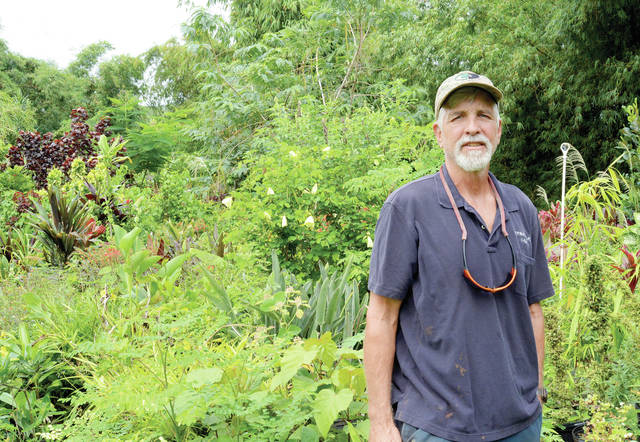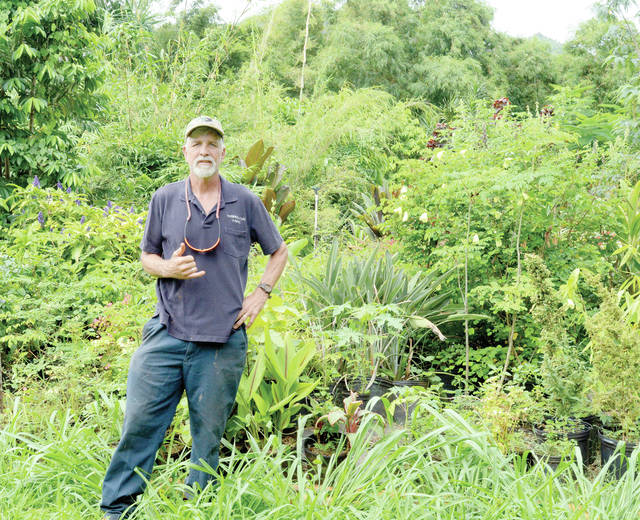The state of Hawaii recently issued its first licenses to farmers wanting to grow industrial hemp and for one Kauai farmer, that was good news.
Ray Maki, who has been farming on island for nearly 30 years and had just returned from a vacation in Greece, said he was excited about his new crop at Permaculture Kauai in Kilauea.
“I think everybody’s going to want to have a bottle of Kauai organic hemp oil on the shelf,” he said. “So the market for what we can produce is, just even at the local level, is enormous for small farmers like myself to produce an edible oil that the market really wants.”
The licenses are issued every three months in the state. Maki received a license to grow 10 acres of industrial hemp.
What he’s focused on now is how to produce something organically on a commercial scale, affordably, in Hawaii.
“Farmers in every commodity group have that issue, organic farmers have different challenges and dealing with weeds and pests in a natural way requires research, hard lessons and a lot of skill,” he said.
Maki has been waiting for years for this opportunity.
“I’m like a young farmer again with a new project,” he said.
In 1993, he was the co-founder of Kauai Organic Farms before he began his own farm.
“I’ve just been focused on commercial, organic agriculture the whole time, as a nurseryman, a landscaper and a farmer,” he said.
Maki said he’s passionate about farming because it offers him freedom. He doesn’t have to sit at a desk but gets to enjoy the aina and working with nature.
“I’m very excited about the idea of farming as a science and an art, working with nature and the palate of colors nature provides and skillfully blending the plants together the way nature might do it if it wasn’t a general assembly, but using human intelligence and design in the interest of nature and all of life, figuring out what the most productive relationships between plants, animals, humans and the open environment is,” he said.
Hemp is an amazing, multi-purpose plant, which is why he said he wanted to grow it.
“Food, fiber, medicine in one and just the opportunity to be one of the first farmers of the crop in the state, it just has a lot of potential to grow the agricultural sector here on Kauai and in Hawaii,” he said.
Marijuana and hemp are the same species, but different varieties, he said. Cannabis sativa is the Latin name of both forms of the plant.
The cannabinoid profile in hemp versus marijuana is different.
In marijuana, THC is the psychoactive compound. In hemp, CBD is the cannabinoid that is produced and the legal forms of hemp have .3 of 1 percent of THC in it, so it is federally legal to grow industrial hemp under a licensed program, he said.
The crops have to be tested to ensure the legal limits, he said.
Because they’re starting out at the end of the season, Maki said they’re testing varieties in the laboratory to make sure the plants are legally conforming, with the hope of catching the season in the spring.
“We plan to process it ourselves,” Maki said. “It will be alcohol extracted into its oil form and then it will be available for inclusion in in-state products and nationally, for people to blend it into dietary supplements or medicinal products,” he said.
In Hawaii, hemp will grow to be a 4- or 5-foot-tall plant. On Oahu, they’re testing plants that can grow 12 feet high, so Maki will be trying some of those fiber and seed crops this year.
The cannabinoid profile of hemp is dominate in CBD, cannabidol, which is an herbal supplement that has shown a broad array of medical benefits, he said. It’s a medicine in the hands of the people that can be grown cheaply, that’s easy to process and easy to distribute.
“It might work great for one person, it might not work for another,” he said.
“That’s another thing about this medicine I am really excited about: its availability for real human needs in a locally sourced organic form is really something I’m eager to share.”
The administrative rules regarding the crop and licenses were written about four years ago, so farmers have been waiting for the state to develop a licensure program, Maki said.
“I’m just throwing my hat in the ring and seeing where it can get us,” he said.




I live on 4.5acres half way up Lawai Valley.We’ve lived here 5yrs.Would I be able to grow it also?Would very much like to learn how?Any advice woud be appreciative!Mahalo!